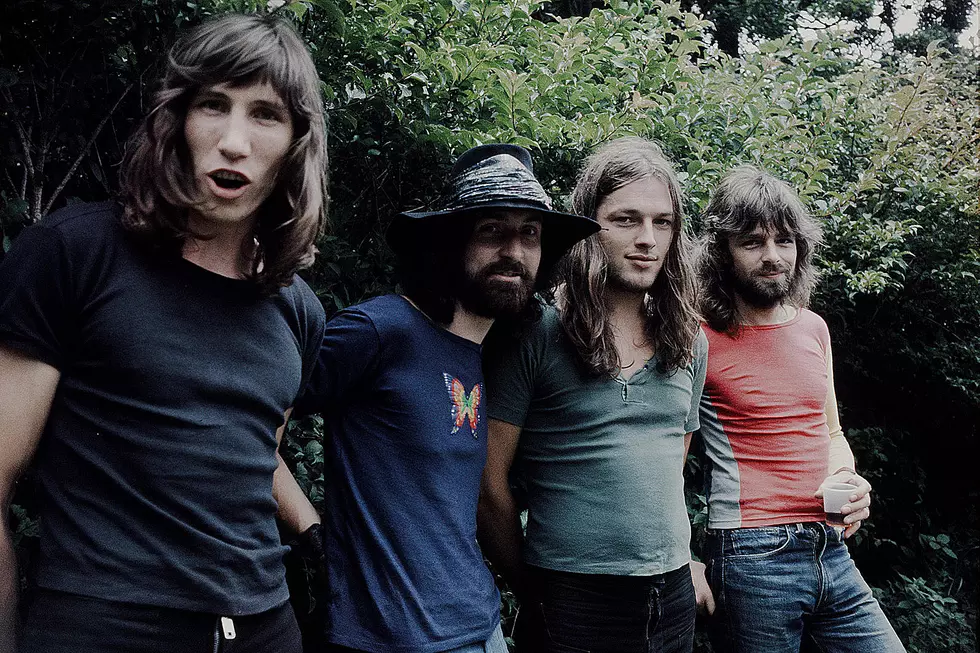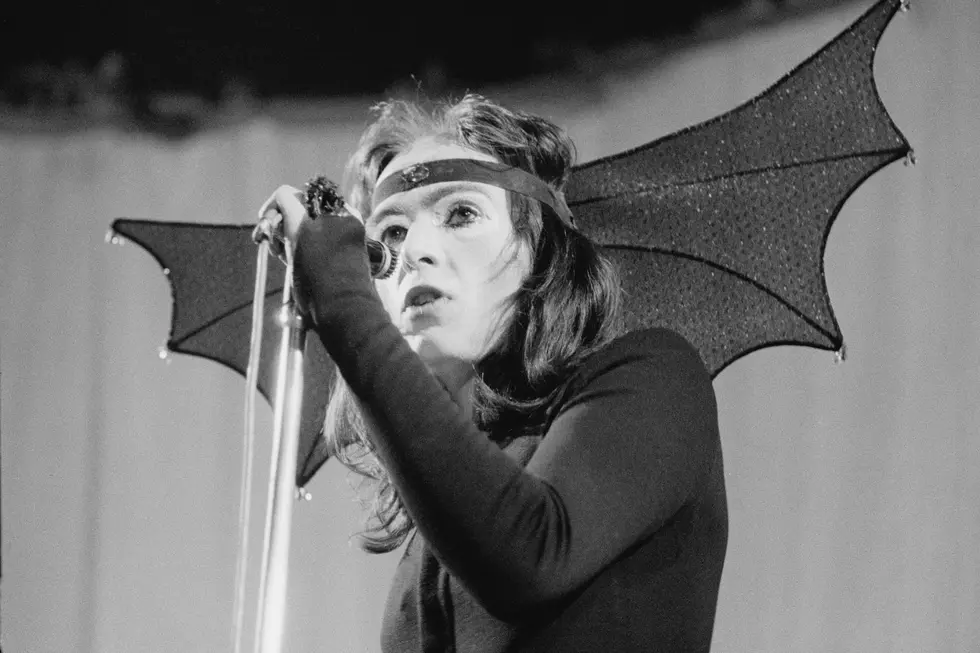
The 10 Heaviest Pink Floyd Songs
Pink Floyd had heaviness in their DNA from day one — just not always the head-banging type.
Back in their early days, psych-rock classics like "Set the Controls for the Heart of the Sun" offered a visceral power maximized via cranked-up amplifiers. And after the 1968 exit of original mastermind Syd Barrett, as they moved from small clubs to stadiums, the band organically inched toward the flash and muscle of hard rock. While they were never virtuosos, some of their signature songs — including highlights from The Wall and The Dark Side of the Moon — were carried by David Gilmour's bluesy, lyrical lead guitar. When the mood struck (and the concept supported it), they could rip with the best of them.
While we haven't necessarily rounded up their best tunes, this list does point to a fascinating intersection of intensity and quality. Here are the 10 Heaviest Pink Floyd Songs.
10. "Money"
The Dark Side of the Moon is the definitive psychedelic album, but its most famous track is tethered to Earth, not drifting in space. "Money," a seething critique of unquenchable greed set partly in 7/4, is jackhammer blues rock from start to finish — even the quiet bits, like the descending chromatic riff in the instrumental section, have inspired decades of steering-wheel drumming. Gilmour’s smoldering guitar solo, full of gently pinched harmonics and bent flourishes, sounds like it’s actually on fire.
9. "Have a Cigar"
Ever listened to the stilted alternate version of hard-funk heavyweight "Have a Cigar"? The one Gilmour and Roger Waters sang in unison and then, dissatisfied with the results, brought in folk-rock pal Roy Harper to finish off? If not, do yourself a favor and stay away. Harper’s gleefully unhinged delivery makes this song tick — from his falsetto break on the line "everybody else is just green" to the full-on belting of "riding the gravy train." It’s the perfect franticness they needed, channeling the slimy suits and dollar-driven executives roasted in Waters’ lyrics.
8. "When You’re In"
Gilmour’s grinding blues riff pairs nicely with Wright’s Hammond organ on this two-minute instrumental. Like much of Obscured by Clouds, the band’s hit-or-miss soundtrack to the mysterious French film La Vallee, it feels half-finished — the early fade-out here is a total buzzkill. But "When You’re In" made more sense onstage: Floyd played it 47 times, during their Paris shows with the Roland Petit Ballet, and paired it with "Obscured By Clouds" during the Dark Side tour.
7. "Pigs (Three Different Ones)"
Waters lashes out with righteous fury at society's smarmiest and most hypocritical elite. And the arrangement matches that spirit, with his crunching rhythm guitar ricocheting off Gilmour's funky fretless bass. (It's a unique instrumental role reversal — one they should have tried more often.) The latter seals the heavy deal with a squawking, slimy talk-box solo.
6. "In the Flesh?"
Pink Floyd launch their sprawling psychodrama with woozy, stadium-sized hard rock punctured by gusts of the waltzing choir. Waters presents the first glimpse of his Pink persona, a jaded rock star performing for an arena of stoned fans basking in "that space cadet glow." Toward the end, with Hammond organ purring into the stratosphere, our protagonist calls for the crew to "roll the sound effects" and "drop it on them," blurring fantasy and reality amid aircraft sounds.
5. "One of These Days"
No one made rock music better suited for headphones. "One of These Days" opens 1971's Meddle with dimensions of effects that fans are still decoding decades later: the echoing bass guitars that conjure helicopter propellers, the slide guitars that rev like motorcycle engines, the organs that stab like sonar pings. Suddenly we hear a pitch-shifted Nick Mason shout out a menacing warning: "One of these days, I'm going to cut you into little pieces!" And then the dam breaks.
4. "Careful With That Axe, Eugene"
This droning, quiet-loud psych epic has a history longer than Richard Wright's swirling organ solo: Pink Floyd first recorded it as the B-side to 1968 single "Point Me at the Sky," and that version later appeared on the 1971 compilation LP Relics; they also rerecorded the piece for Michelangelo Antonioni's 1970 drama Zabriskie Point, using the new title "Come In Number 51, Your Time Is Up." But the best, heaviest version is an extended live rendering featured on 1969's Ummagumma — Waters' horror-film scream at 3:08 is one of the most frightening moments in rock history.
3. "Not Now John"
It’s no coincidence that 1983’s "Not Now John," the only Final Cut track largely fronted by Gilmour, is also its heaviest: No one belts out a raspy rock vocal quite like him. As the album’s lone single, it was a bit of a misnomer — its thick distortion and stacked backing vocals contrasting with the other tracks’ densely crafted atmospheres. "Fuck all that!" How nasty!
2. "The Nile Song"
Gilmour shared a couple of vocals on his Pink Floyd debut, A Saucerful of Secrets — but he didn’t showcase his full singing potential until 1969’s More, their soundtrack to Barbet Schroeder’s drug-addiction drama of the same name. While the folky "Green Is the Colour" highlighted his sweetness and warmth, the maniacally heavy "Nile Song" allowed him to shout his lungs out. It’s not much of a song: a handful of distorted guitar chords, some bombastic drum fills, lyrics so dumb they’re hardly worth writing down ("I was standing by the Nile / When I saw the lady smile / I would take her out for a while"). But the aggression, which spills into the sorta-reprise "Ibiza Bar," is intoxicating nonetheless.
1. "Young Lust"
The most overtly hard rock moment on Floyd’s final masterpiece, "Young Lust" is one of three Wall tunes cowritten by Gilmour. His presence carries the entire track, from squealing leads and distorted riffs to a full-throated holler that rivals "The Nile Song" in physicality. Waters made the same comparison in 1979, telling the BBC, "It reminds me very much of a song we recorded years and years ago called 'The Nile Song.' It’s very similar. Dave sings it in a very similar way. I think he sings 'Young Lust' terrific — I love the vocal." The song’s horny lyric adds to the intensity ��� but as Waters noted in the same interview, this tale of casual sex was intended as a "pastiche of just any young rock 'n' roll band out on the road."








